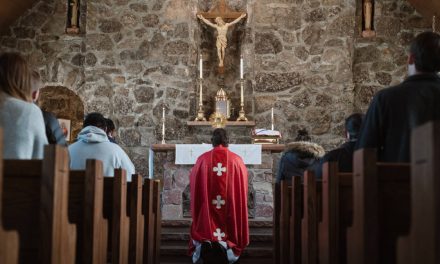 Look around after Mass or observe the folks attending ministry meetings and parish events and ask yourself: Where are all the young adults? According to the Fast Facts on Young Adults page listed on the USCCB website, the Church defines “young adults” as 18-40 years of age and says that 40% of Catholics today belong to this age group. Only 24 percent of young adult Catholics attend weekly Mass, while 21 percent attend two to three times per month, according to a 2005 study conducted by sociologists William V. D’Antonio, James Davidson, Dean Hoge and Mary Gautier, authors of the book Catholics in America: Their Faith and Their Church (Sheed & Ward). According to the same study, 80 percent of young adult Catholics believe they can be a good Catholic without attending Mass weekly, a belief that clearly differentiates them from their parents’ generation. Their parents were taught by the Church that missing Mass and Holy Days of Obligation was a grave offense and a mortal sin.
Look around after Mass or observe the folks attending ministry meetings and parish events and ask yourself: Where are all the young adults? According to the Fast Facts on Young Adults page listed on the USCCB website, the Church defines “young adults” as 18-40 years of age and says that 40% of Catholics today belong to this age group. Only 24 percent of young adult Catholics attend weekly Mass, while 21 percent attend two to three times per month, according to a 2005 study conducted by sociologists William V. D’Antonio, James Davidson, Dean Hoge and Mary Gautier, authors of the book Catholics in America: Their Faith and Their Church (Sheed & Ward). According to the same study, 80 percent of young adult Catholics believe they can be a good Catholic without attending Mass weekly, a belief that clearly differentiates them from their parents’ generation. Their parents were taught by the Church that missing Mass and Holy Days of Obligation was a grave offense and a mortal sin.
Before we address the problem of their conspicuous absence, let’s look at some of the reasons why they may be straying. I would suggest to you that many young adult Catholics go off to college where the environment is not typically supportive of living a devout Catholic life. Assuming they are not in a strong Catholic school, they will be constantly exposed to at best; religion-neutral professors who do not embrace Church teaching or the idea that Christ should be at the center of their lives. They will be subjected to enormous peer pressure to have a good time and taste the worldly pleasures of alcohol, drugs and sex and trained to work in a world that has largely forgotten how to value virtue and ethics. Upon graduation, they embark on an urgent search for the best paying job to buy those things to which our culture attaches stature and prestige and live the perfect happy life. Attending Mass and going to Reconciliation regularly are not part of this plan and far too many of our young adults drift away from the Church during this crucial period. The drift likely started after Confirmation, but we don’t seem to register the Church’s great loss until we look around our parishes and see so few of this younger, post college generation. It is a tragedy and we need to do something.
Have we come to rely too heavily on marriage and children to bring our young Catholics back into the fold? To be sure, you can often observe this phenomenon as young couples bringing their children to the parish for Baptism begin to recall their own Catholic childhoods and want the same for their children. The problem is we are not getting all of them back! With so many babies being born out of wedlock and couples living together without marriage, we can’t rely on the Sacraments of Marriage and Baptism alone to reconcile our young adults to the Church. Also, people in general are waiting longer to get married. If you will agree with my premise that we are losing many from this important group, then can you agree that we must avoid losing them in the first place?
When I was in college I rebelled against everything my parents stood for, as I suspect many of us did. I didn’t realize how smart my parents were until I had children of my own. In my rebellion against them and God, which lasted until my conversion into the Catholic Church in 2006, I sorely needed guides and mentors to show me the way back to Christ. I had role models, but they were largely business leaders who I admired for their work success. Do our young people have mentors and role models to show them the Truth and Beauty of our Faith? Isn’t it our responsibility to speak to and work with this “lost generation” and help them learn from our experiences? Try to look at young adults Catholics as New Mission Territory. We Catholics are wonderful about feeding the hungry, sheltering the homeless and helping people with a host of serious problems, but how often do we focus on mentoring our young adults and nurturing their faith?
The news is not all bad. There are flourishing LifeTeen, Theology on Tap, Young Adult Ministries and Young Married Ministries in many parishes around the country. The successful programs have focused on some of the following important points to reach these sons and daughters of the Church and help them stay on track:
- They are seeking input and actively listening to the challenges and ideas of these young adults. They are not standing with arms crossed and preaching at them to “change or else!”
- Successful ministries all over the country reflect a strong focus on spiritual, social and service activities. Young adult bible studies and special Mass times, dinners and social mixers with peers and service oriented projects to fully develop their sense of stewardship are good examples of these activities.
- The issues faced by younger generations today are in many ways different from the issues we once faced and they require different approaches. This is not about modifying our Catholic Faith, but making our Faith relevant and understandable to solve the challenges of this group.
- We could all stand to remember that our Catholic Faith is exciting! Successful ministries are inspiring these young adult Catholics to experience our faith as vibrant and real and helping them see that a Christ-centered life in the Church He founded is the only answer.
- The embrace of technology and new social media are critical in reaching and communicating with young adults today. Email, Face Book, LinkedIn, Twitter, content-rich websites, blogs and podcasting are some of the many tools we can better utilize to share the Church’s message.
- Parishes focused on engaging young adults are recognizing that many Protestant churches offer what may appear to be exciting alternatives for vulnerable Catholics. The music, the energy and the “feel good” message of these other churches offers a strong temptation to young adult Catholics, but they lack something very important. These churches simply don’t have the fullness of the Faith that we are blessed to have in the Catholic Church. We can learn a few things from Protestants in terms of presentation, but we have the Truth and it is our best resource to keep Catholics from straying.
- The leadership being provided to these successful young adult ministries is humble and authentic. The style of communication is more conversational than preachy.
In my discussions with young adults I have encountered a number of people who were eager to share their thoughts and perspectives on their Catholic faith. While doing research on the USCCB website I came across a quote from a young Catholic woman in New York named Michelle M. Mystkowski who had written to the Bishops. Her thoughts capture and summarize very well the opinions of many I have encountered:
As a young adult in today’s dynamic society, I—like so many other young adults—am hungry. I have felt a strong spiritual hunger, a hunger that stems from the need to discover who I am, who is my God, and what is my purpose in society. It is a hunger that once fed can continue to fuel my life journey in a direction that would follow the footsteps of Christ.
It is my hope that the Catholic Church will help guide me through this transitional period of my life; to keep me in touch with the “big picture” of life while I strive to pursue both my immediate and distant dreams; to help me find peace along the way. It is also my hope that the Catholic Church will provide us, as young adults, with the opportunities to truly feel an integral and necessary part of the church community; to provide us the chance to gather with other young adults so that we may share and reflect on our life journey and self-discovery together.
I believe that through a community of encouragement and support based on the life and teachings of Christ, the Catholic Church can give me the inspiration, strength, and perseverance necessary to continue my journey and to realize my hopes and dreams for life.
The challenge I have addressed in this article may seem daunting, but we have a responsibility to help. The future of our Church will be in the hands of this generation after we are long gone. What can we do to make a positive difference? I don’t pretend to have all the answers, but it seems to me that we can make a difference in 4 meaningful ways-Prayer, Engagement, Education and Example.
- Prayer-We can and should pray for these young adult Catholics to find their way. Let us also pray for Pope Benedict XVI and our Bishops, Priests and Deacons to be guided by the Holy Spirit in providing leadership and inspiration in solving this challenge. Let us pray for ourselves that we will have discernment, wisdom, courage and humility as we offer assistance and guidance to the young adults among us.
- Engagement-We can seek out and listen to young adults. By sincerely listening to their challenges, doubts and questions we can establish a platform for engagement and begin to address their needs more appropriately. At some point in our lives, it is likely that others reached out and met us where we were to offer us help-we can do the same. Invite them to Mass and parish events, invite them to a ministry meeting or simply have coffee and a meaningful conversation. The point is we have to try (and keep trying).
- Education-As we are engaging with young adults, we will likely hear about differences they may have with certain aspects of Church teaching. This provides an opportunity to educate and inform in a loving way about the truth of our faith, the role of the Magisterium and point them towards books, articles and orthodox/safe Catholic website resources. Consider these powerful words from Pope Benedict XVI: “Speaking against the Magisterium of the Church is presented as courageous. In reality, however, it does not take courage for this, since you can always be sure of audience applause. . . .Rather it takes courage to adhere to the faith of the Church, even if it contradicts the ‘scheme’ of the contemporary world. It is this non-conformism of the faith that Paul calls an adult faith.”
- Example-Do we make our Catholic Faith look desirable? Do we reflect joy to others? Are we Lights for Christ in the world? Our real challenge and the way we can truly help young adults in the Church passionately embrace their faith is if they see us do the same. Author Francis Fernandez wrote this observation in his book, In Conversation With God, “Jesus said to his disciples: ‘You are the light of the world’. The light of the disciple is the light of the Master himself. In the absence of this light of Christ, society becomes engulfed in the most impenetrable darkness. Christians are to illuminate the environment in which they live and work. A follower of Christ necessarily gives light. The very witness of a Christian life, and good works done in a supernatural spirit, are effective in drawing men to the faith and to God. Let us ask ourselves today about our effect on those who live side by side with us, those who have dealings with us for professional or social reasons. Do they see this light which illuminates the way that leads to God? Do these same people feel themselves moved, by their contact with us, to lead better lives?”
A friend who knew I was writing this article asked me a great question: How do we find these young adult Catholics? One suggestion is to simply be more aware. Seek out people at Mass who you don’t know and introduce yourself (good practice for all of us anyway!). This contact may lead you to getting to know them better in the following weeks. Another suggestion is to ask your friends in the parish community if they have friends or relatives in this age group who may be struggling with their faith. I have rarely met someone in our parish community who doesn’t know a struggling young adult Catholic. Finally, ask our Priests and Deacons if they can point you towards young adults in the parish and offer to reach out as I outlined earlier.
This is not a brand new issue and there is much discussion and debate in the Church today on this topic with some progress being made. I simply hope to bring more awareness to an area that had escaped my attention until recently as it may have escaped yours. We have an opportunity and a responsibility to be “salt and light” in the world and help others. I hope you will prayerfully consider reaching out to the group that represents the future of our Church and do what you can to help them on their faith journey.
Randy Hain is the author of The Catholic Briefcase: Tools for Integrating Faith and Work which will be published by Liguori Publications at the end of this year. The Catholic Briefcase is available for pre-order on Amazon.
Please help us in our mission to assist readers to integrate their Catholic faith, family and work. Share this article with your family and friends via email and social media. We value your comments and encourage you to leave your thoughts below. Thank you! – The Editors













